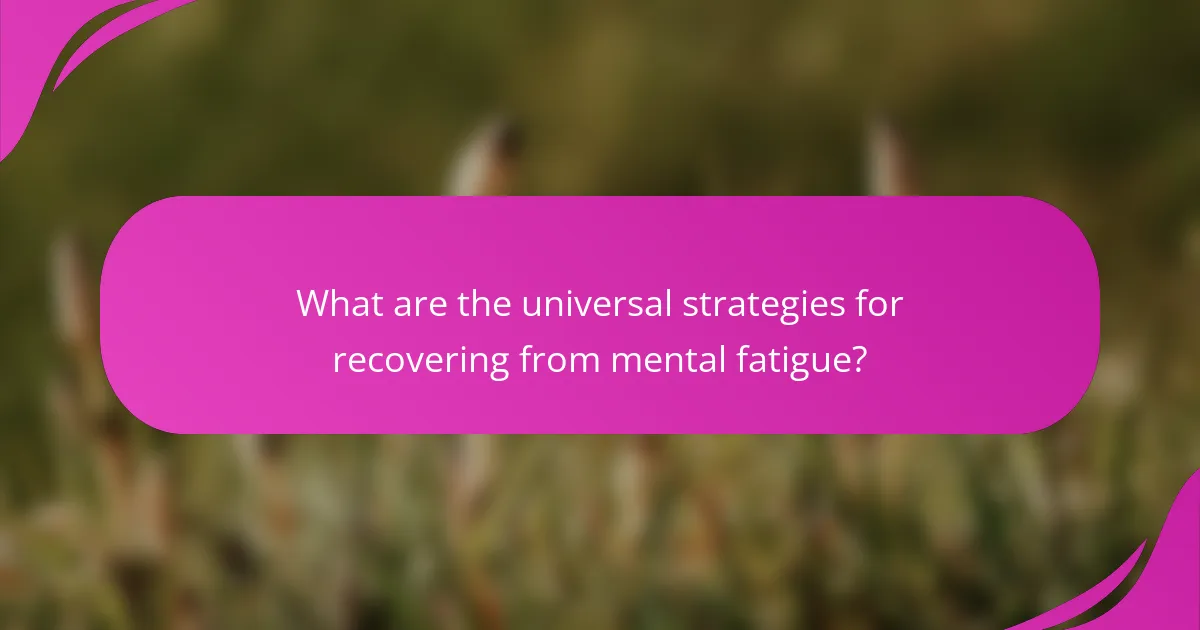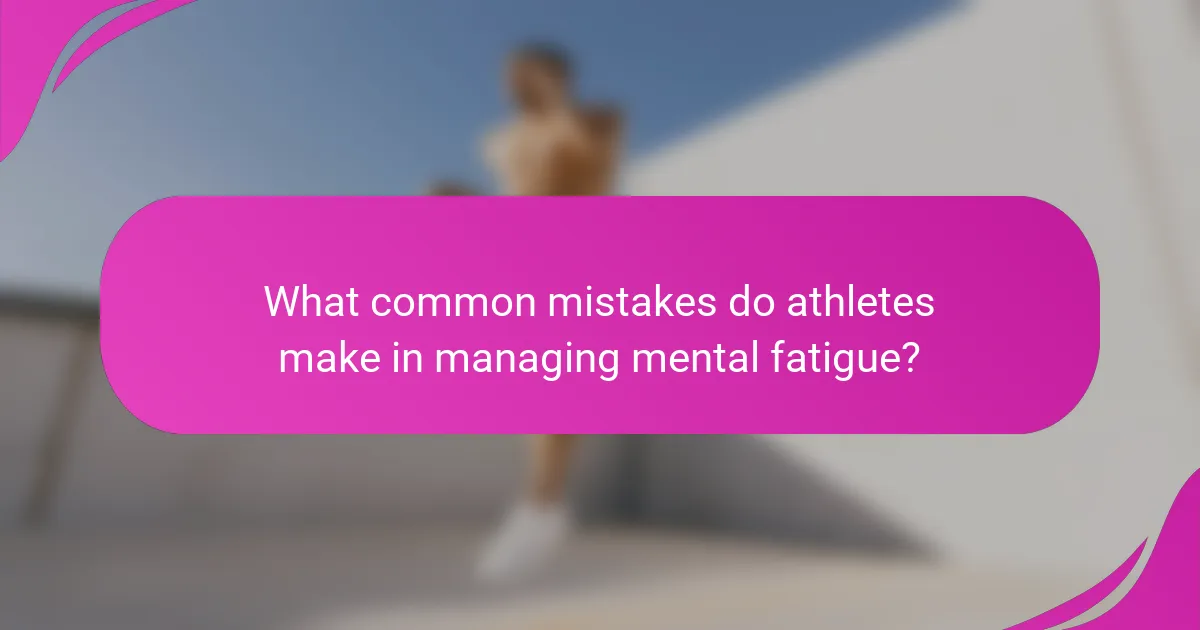Mental fatigue can severely impact athletic performance by diminishing focus, motivation, and decision-making abilities. Effective recovery strategies include prioritizing rest, hydration, and nutrition, alongside mindfulness practices. Unique techniques like cognitive behavioral strategies and visualization can enhance mental resilience. Recognizing and addressing mental fatigue is crucial for maintaining optimal performance levels.

What is mental fatigue and how does it affect athletic performance?
Mental fatigue significantly impairs athletic performance by reducing focus, motivation, and physical endurance. This cognitive strain can lead to decreased decision-making abilities and slower reaction times, ultimately affecting overall performance. Strategies for recovery include proper rest, hydration, and mental breaks, which can enhance resilience and restore focus. Research shows that athletes who manage mental fatigue effectively often demonstrate improved performance metrics, highlighting the importance of mental health in sports.
What are the signs and symptoms of mental fatigue in athletes?
Mental fatigue in athletes manifests through various signs and symptoms. Common indicators include decreased motivation, increased irritability, and difficulty concentrating. Athletes may also experience physical symptoms such as sleep disturbances, headaches, and muscle tension. Cognitive fatigue can impair decision-making and reaction times, impacting overall performance. Monitoring these signs is crucial for recovery and maintaining resilience in training and competition.
How does mental fatigue impact decision-making and reaction times?
Mental fatigue significantly impairs decision-making and slows reaction times. Research indicates that mental fatigue leads to decreased cognitive performance, resulting in slower processing speeds and reduced accuracy in choices. Athletes experiencing mental fatigue may struggle to maintain focus, leading to poor strategic decisions during competition. As a result, recovery strategies such as adequate rest and mental conditioning are essential for optimizing performance.

What are the universal strategies for recovering from mental fatigue?
To recover from mental fatigue, athletes should prioritize rest, hydration, nutrition, mindfulness, and structured recovery strategies. Implementing these strategies enhances focus and resilience.
Rest is crucial; quality sleep restores cognitive function. Hydration supports overall performance and mental clarity. Proper nutrition provides essential nutrients for energy and brain health. Mindfulness practices, such as meditation, reduce stress and improve concentration. Structured recovery, including scheduled breaks and active recovery sessions, helps maintain mental sharpness.
How does proper sleep contribute to mental recovery?
Proper sleep significantly enhances mental recovery by restoring cognitive functions and reducing fatigue. Adequate rest improves focus, decision-making, and overall athletic performance. Studies show that sleep deprivation can impair reaction times and mental clarity, negatively impacting training and competition. Prioritizing quality sleep enables athletes to recover effectively, boosting resilience and maintaining peak performance levels.
What role does nutrition play in alleviating mental fatigue?
Nutrition plays a crucial role in alleviating mental fatigue by providing essential nutrients that support brain function. A balanced diet rich in antioxidants, healthy fats, vitamins, and minerals enhances cognitive performance and reduces fatigue. For example, omega-3 fatty acids found in fish improve mood and cognitive function, while complex carbohydrates provide sustained energy. As a result, proper nutrition can significantly boost athletic performance by enhancing focus and resilience during training and competition.
How important is hydration for cognitive function in athletes?
Hydration is crucial for cognitive function in athletes, impacting focus and mental fatigue. Dehydration can lead to decreased attention, slower reaction times, and impaired decision-making. Research indicates that even mild dehydration can negatively affect cognitive performance, particularly during prolonged physical activity. Maintaining optimal hydration levels supports mental clarity and resilience, essential for peak athletic performance.

What unique recovery techniques can enhance mental resilience?
Unique recovery techniques that enhance mental resilience include mindfulness meditation, cognitive behavioral strategies, and visualization exercises. These techniques help athletes manage stress, improve focus, and build mental strength. Mindfulness meditation promotes awareness of thoughts and emotions, reducing anxiety. Cognitive behavioral strategies enable athletes to reframe negative thoughts, fostering a positive mindset. Visualization exercises enhance performance by mentally rehearsing successful outcomes. Integrating these techniques into training routines can significantly boost mental resilience and overall athletic performance.
How can visualization techniques improve focus and performance?
Visualization techniques can significantly enhance focus and performance by creating mental clarity and reducing mental fatigue. These techniques, such as imagery and mental rehearsal, allow athletes to mentally practice their skills, leading to improved concentration and execution during competition. Research indicates that visualization can decrease anxiety levels, which further enhances performance by fostering a calm and focused mindset. By incorporating visualization into their training routines, athletes can build resilience and maintain peak performance even under stress.
What is the significance of mental training and cognitive exercises?
Mental training and cognitive exercises significantly enhance athletic performance by reducing mental fatigue and improving focus. These strategies promote resilience, allowing athletes to recover effectively from stress. Research shows that mental fatigue can impair decision-making and physical endurance, making cognitive exercises essential for optimal performance. Techniques such as visualization and mindfulness have been linked to improved concentration and reduced anxiety, further supporting athletes in high-pressure situations.

What are the rare but effective practices for managing mental fatigue?
To manage mental fatigue effectively, consider integrating practices such as mindfulness, strategic breaks, and cognitive restructuring. Mindfulness enhances focus and reduces stress, while strategic breaks prevent burnout by allowing mental recovery. Cognitive restructuring helps reframe negative thoughts, promoting resilience. These rare practices can significantly improve athletic performance by maintaining mental clarity and emotional balance.
How can biofeedback be utilized for mental recovery?
Biofeedback can effectively enhance mental recovery by promoting self-regulation of physiological functions. This technique helps athletes manage stress and mental fatigue, improving focus and resilience. Biofeedback provides real-time data on physiological states, allowing individuals to recognize and alter their responses to stressors. For example, heart rate variability training can lead to better emotional regulation, which is crucial for recovery. Studies indicate that athletes using biofeedback report reduced anxiety levels and improved performance consistency.
What innovative technologies assist in monitoring mental fatigue?
Wearable devices, neurofeedback systems, and mobile applications are innovative technologies that assist in monitoring mental fatigue. Wearable devices track physiological markers like heart rate variability and sleep patterns, providing insights into mental fatigue levels. Neurofeedback systems measure brain activity to help athletes understand their mental state and optimize focus. Mobile applications offer real-time assessments and personalized strategies to manage fatigue, enhancing recovery and performance. These technologies enable athletes to make informed decisions about their training and recovery strategies.

What common mistakes do athletes make in managing mental fatigue?
Athletes often overlook signs of mental fatigue, leading to poor performance. Common mistakes include neglecting rest, failing to recognize mental exhaustion, and not utilizing mental recovery techniques. These oversights can hinder focus and resilience, ultimately impacting athletic performance.
How can overtraining lead to increased mental fatigue?
Overtraining can significantly increase mental fatigue due to the depletion of neurotransmitters and energy levels. This condition often results from excessive physical training without adequate recovery, leading to a state of chronic stress. As a result, athletes may experience decreased focus, impaired decision-making, and heightened anxiety, ultimately affecting their performance. Recovery strategies such as proper rest, nutrition, and mental relaxation techniques are essential to mitigate these effects and restore mental clarity.
What are the pitfalls of neglecting mental health in training regimens?
Neglecting mental health in training regimens leads to decreased athletic performance, increased risk of injury, and mental fatigue. Athletes may experience burnout, diminished focus, and reduced resilience. These pitfalls can undermine training efforts and hinder long-term success. Addressing mental health proactively enhances recovery and optimizes overall performance.

What best practices can athletes implement for optimal recovery?
Athletes can implement practices such as mindfulness, proper nutrition, and adequate sleep for optimal recovery. Mindfulness techniques enhance focus and reduce mental fatigue, improving overall performance. Nutrition plays a critical role; a balanced diet supports physical and mental recovery. Adequate sleep is essential for cognitive function and resilience, allowing athletes to bounce back effectively after training or competition.
How can athletes create a personalized recovery plan?
Athletes can create a personalized recovery plan by assessing their unique mental fatigue levels and performance needs. Start by identifying specific stressors affecting focus and resilience. Incorporate techniques like mindfulness, structured rest periods, and nutrition tailored to individual preferences. Regularly evaluate progress and adjust strategies based on effectiveness.
What resources are available for ongoing mental health support?
Mental health support resources include therapy, support groups, and online platforms. Professional therapy offers personalized guidance, while support groups provide community and shared experiences. Online platforms like mental health apps and websites offer tools for self-care and coping strategies. Each resource plays a unique role in enhancing mental resilience and recovery for athletes facing mental fatigue.